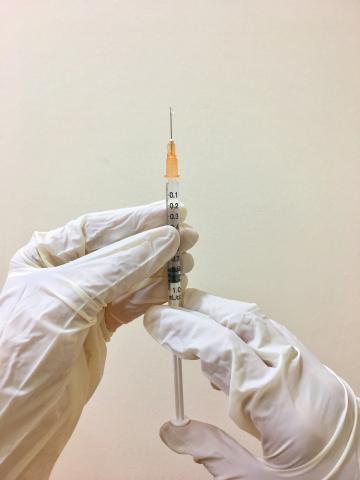HPV vaccine helps protect against some types of cancers

With the beginning of a new school year approaching, the Public Health Agency (PHA) is reminding parents of children who will be entering year 9 that they will be offered the human papillomavirus (HPV) vaccine during the school year.
The HPV vaccine helps to prevent HPV-related cancers from developing in young people. While most types of HPV are harmless, some high-risk types can lead to the development of cancers, including cervical cancer, cancers of the head and neck (mouth and throat) and cancers of the anus and genital areas.
Both boys and girls in year 9 are offered a single dose of the HPV vaccine which gives long lasting protection.
Rachel Spiers, Immunisation and Vaccination Programme Manager at the PHA, said: “The HPV vaccination programme is one of the most successful vaccination programmes in the world and has dramatically lowered the rates of cervical cancer and harmful infections preventing many cancers and saving lives.
“Getting the HPV vaccine now will help protect your child against HPV infection and associated cancers when they are older, including over 90% of cervical cancers in women, and cancers of the mouth, throat, anus and genitals in men and women.
“The vaccine is offered as part of the school-based vaccination programme. It is given in the same way as many other vaccines through an injection in the upper arm and only one dose is required. The body then reacts by making antibodies that will help the immune system fight HPV infection. The vaccine cannot cause HPV infection or cancer.”
Parents should look out for information about the vaccine along with the consent form coming home from school prior to the vaccination programme commencing in their child’s school.
If parents have any questions about the vaccine, they can find more information on the PHA website www.pha.site/HPVvaccination or they can contact their HSC Trust school nursing team directly when school starts again.
If your child missed getting their HPV vaccine in year 9, it is vital you get them protected. Contact your HSC Trust school nursing team or GP practice to arrange an appointment – your child will remain eligible to receive the vaccine until their 25th birthday.
Rachel concluded: “I would urge all parents or guardians to talk to their children about the importance of getting the HPV vaccine and ensure that those eligible return their consent forms to their school and get the vaccine when offered during the forthcoming school year.”
- HPV is a very common virus – about 8 out of 10 people catch it at some time in their lives and it is easily spread through sexual activity. It is recommended that young people have the vaccine now because studies show that protection from the vaccine is better when it is given at an earlier age before they are exposed to the virus.
- Routine adolescent HPV immunisation programme for all children in school year 9 (aged 12 to 13 years), offered mainly in secondary schools – this includes children not in mainstream school via a community clinic delivery model.
- Those who missed out on their one dose HPV vaccine can catch up until their 25th birthday via their GP practice.
- NI Direct – human papillomavirus (HPV): www.nidirect.gov.uk/conditions/human-papillomavirus-hpv
